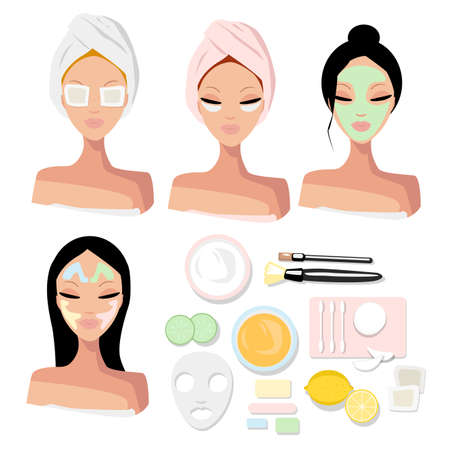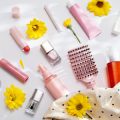1. Understanding Teen Skincare and Makeup Trends
In today’s fast-paced, social media-driven world, American teens are more engaged with skincare and makeup than ever before. With platforms like TikTok and Instagram shaping beauty standards, trends such as K-beauty routines, “clean girl” aesthetics, and bold self-expression through makeup are widely popular among youth. These trends go beyond just looking good—they play a significant role in how teens view themselves and construct their identities. For many, experimenting with skincare products or trying out new makeup looks is a way to express creativity, fit in with peers, or gain confidence. However, this heightened focus on appearance can also lead to pressure to conform to certain beauty ideals or develop insecurities about natural features. As parents, understanding these evolving trends is crucial for providing guidance that balances healthy self-expression with realistic expectations and emotional well-being.
2. Opening Up: Candid Conversations between Parents and Teens
When it comes to teen skincare and makeup, honest and open conversations are key. In American culture, where individuality and self-expression are celebrated, parents play an important role in guiding their teens through this journey without judgment. Setting a safe space for discussion helps teens feel heard and respected, while also allowing parents to share their own values and concerns.
Open dialogue is more than just talking about products—its about understanding the reasons behind beauty choices. For some teens, makeup is a form of creative expression; for others, its about fitting in or gaining confidence. When parents approach these topics with empathy rather than criticism, it fosters mutual trust and helps teens make informed decisions.
Why Judgment-Free Dialogue Matters
| Benefits for Teens | Benefits for Parents |
|---|---|
| Boosts self-esteem | Encourages open communication |
| Promotes healthy self-expression | Allows sharing of family values |
| Reduces pressure to conform | Builds stronger relationships |
| Empowers informed decision-making | Helps address concerns early |
Cultivating Respectful Communication
Talking about skincare routines or makeup trends can be an opportunity to connect. Ask your teen why theyre interested in certain products or looks. Share your own experiences, but avoid imposing your preferences. Use phrases like “Tell me what you like about this” or “How does this make you feel?” This shows that youre genuinely interested in their perspective.
Aligning on Personal Values
Every family has its own beliefs around beauty and self-presentation. Instead of enforcing strict rules, discuss what these values mean and how they can be reflected in everyday choices. Encourage your teen to express themselves while considering factors like age-appropriateness, skin health, and self-confidence.
By keeping the conversation open, respectful, and nonjudgmental, parents can support their teens exploration of skincare and makeup in a way that strengthens both self-worth and family bonds.

3. Setting Healthy Boundaries
As teens become more interested in skincare and makeup, its essential for parents to set healthy boundaries that foster both safety and self-expression. Finding the right balance can be challenging, but open communication and clear guidelines help support your teen’s growth while respecting their individuality.
Age-Appropriate Guidelines
Start by considering your teen’s age and maturity level when discussing skincare and makeup use. For younger teens, focus on the basics: gentle cleansers, sunscreen, and perhaps a light moisturizer. As they get older, you can gradually introduce more products or allow them to experiment with simple makeup looks. Let your teen know that these boundaries are there to protect their skin health and boost their confidence—not to stifle creativity.
Smart Product Choices
Help your teen make informed choices by researching products together. Look for non-comedogenic, fragrance-free, and dermatologist-recommended items—especially if your teen is prone to breakouts or has sensitive skin. Encourage reading ingredient labels and understanding what goes onto their skin. If your teen wants to try trendy products from social media, discuss their pros and cons openly rather than dismissing them outright.
Makeup Limits with Flexibility
Set reasonable limits on makeup use based on context—for example, lighter looks for school days and more creative options for special occasions. Explain that these boundaries aren’t about control, but about helping them present themselves authentically in different settings. Always leave room for negotiation as your teen matures; involve them in setting these rules so they feel heard and respected.
Ultimately, the goal is to empower your teen with guidance that allows them to explore skincare and makeup safely while learning responsibility and self-expression. By approaching boundaries as a collaborative process, you’ll strengthen trust—and help your teen develop a positive relationship with their own unique style.
4. Encouraging Confidence and Self-Care
Empowering teens to value self-care and inner beauty is just as important as guiding them through skincare routines or makeup choices. As parents, fostering confidence helps teens develop a healthy relationship with themselves and their appearance—something that lasts far beyond the latest trends. Here are some meaningful ways to encourage this mindset:
Modeling Healthy Habits
Parents are powerful role models. By prioritizing your own self-care, whether it’s a simple skincare regimen, balanced nutrition, or regular exercise, you demonstrate that taking care of oneself is a lifelong value. Share your routines openly and invite your teen to join in, making self-care a positive family activity rather than a chore.
Shifting Focus from Trends to Wellness
While it’s normal for teens to be curious about popular trends on social media, guiding conversations toward wellness rather than perfection can help build resilience against external pressures. Encourage discussions about how certain habits—like adequate sleep, hydration, and gentle skincare—support both physical health and emotional well-being.
| Surface-Level Trends | Holistic Self-Care Practices |
|---|---|
| Following viral makeup hacks | Learning proper skin cleansing techniques |
| Obsessing over “flawless” looks | Cultivating gratitude and positive self-talk |
| Buying every new product | Understanding ingredient labels & patch-testing |
Nurturing Inner Beauty
Remind your teen that true confidence comes from within. Compliment qualities like kindness, creativity, or perseverance just as often as outward appearances. Help them explore hobbies or passions that make them feel good about themselves, reinforcing that their worth is not tied to looks alone.
Tips for Parents: Supporting Confidence and Self-Care
- Listen without judgment when your teen talks about insecurities.
- Avoid negative body talk (about yourself or others) around your teen.
- Celebrate achievements unrelated to appearance.
- Encourage open conversations about the pressures of social media and advertising.
The Bottom Line
Your support can empower teens to approach skincare and makeup as tools for self-expression and wellness—not validation. By promoting healthy habits and inner confidence, you give them the foundation they need to thrive in their own unique way.
5. Navigating Social Pressures and Media Influence
Teens today are constantly exposed to curated images and beauty ideals on platforms like Instagram, TikTok, and YouTube. As parents, it’s important to help your teen recognize that what they see online isn’t always real life. Start conversations about how filters, photo editing, and sponsorships can create unrealistic expectations. Encourage your teen to ask questions like, “Is this image edited?” or “Who benefits from this beauty trend?” By guiding them to think critically, you empower them to make healthier choices for themselves.
Understanding Media Messages
Help your teen break down the messages behind ads and influencer posts. Discuss how companies use targeted marketing to sell products, often by making people feel insecure about their natural appearance. Remind them that everyone’s skin is different and that trends come and go. Teach them to celebrate diversity in beauty standards by following a variety of creators who promote self-acceptance and inclusivity.
Encouraging Open Dialogue
Create a safe space where your teen feels comfortable sharing their thoughts about beauty trends and peer pressure. Listen without judgment and share your own experiences with media influence if you feel comfortable. This helps normalize doubts or insecurities they may have and reinforces the idea that nobody needs to fit a single mold to be beautiful.
Practical Strategies for Critical Thinking
Suggest taking social media breaks together or curating feeds to include positive, body-neutral content. Practice fact-checking claims made by influencers about skincare or makeup products before making purchases. Encourage your teen to support brands and personalities that value honesty, transparency, and authenticity over perfection.
By guiding teens through the noise of social pressures and ever-changing trends, parents can nurture confidence and resilience—helping their children embrace their unique identities while making informed decisions about skincare and makeup.
6. Finding Balance: Support and Supervision
Striking the right balance between guidance and freedom is essential when it comes to teens exploring skincare and makeup. As a parent, your role is not just about setting boundaries, but also about nurturing your teen’s sense of self-expression and independence. It’s important to provide a safe space where your teen feels comfortable asking questions, making mistakes, and learning from them. Rather than enforcing strict rules, try having open conversations about the reasons behind certain guidelines—whether it’s about product safety, skin health, or age-appropriateness.
Encourage your teen to share their interests and inspirations when it comes to beauty routines. Maybe they’re curious about a new skincare trend or want to experiment with bold makeup looks seen on social media. Listen actively and offer practical advice, such as researching products together or discussing the importance of patch-testing new items. This approach shows respect for their growing autonomy while reinforcing healthy habits.
Supervision doesn’t have to mean micromanagement. Instead, think of yourself as a collaborator in their journey—a supportive presence who helps them navigate choices safely. For instance, you might set boundaries like no sharing makeup with friends (to avoid bacteria), or limiting certain products until they’ve researched possible allergic reactions. At the same time, celebrate their creativity by encouraging them to express themselves through colors or styles that make them feel confident.
It’s natural for teens to push boundaries as they discover who they are. By staying involved without being overbearing, you model trust and responsibility. When disagreements arise—perhaps over a particular look or product—use it as an opportunity for dialogue rather than discipline. Ask what appeals to them about their choice, and explain your perspective honestly but kindly.
Ultimately, finding balance is about mutual respect and ongoing communication. Your support empowers teens to make informed decisions and build self-esteem while knowing that you’re there if they need guidance or reassurance along the way. By fostering both supervision and self-expression, you help lay the foundation for lifelong healthy habits in beauty and beyond.


